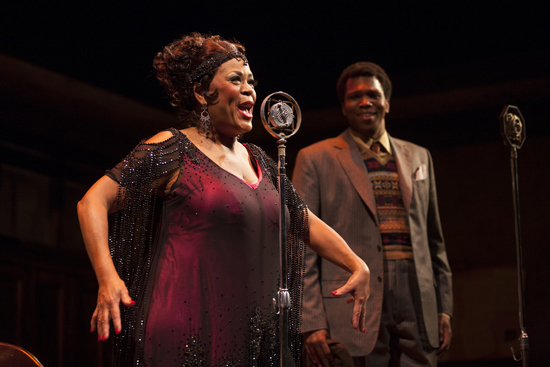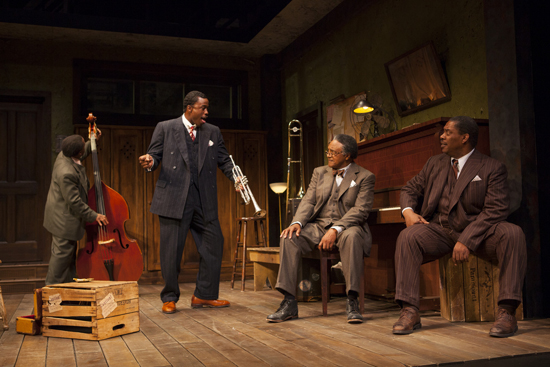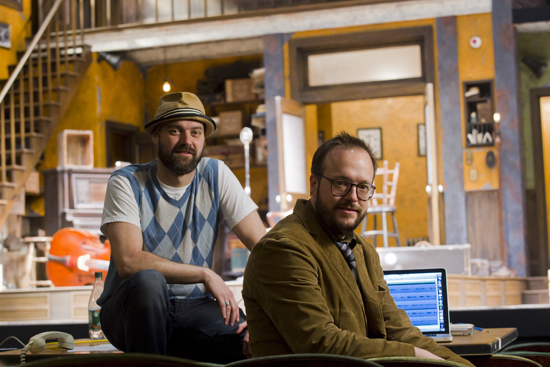Ma Rainey: Searing Look at Racism through Music
Huntington completes Wilson’s “Century Cycle”

Yvette Freeman and Corey Allen in the Huntington Theatre Company production of August Wilson’s Ma Rainey’s Black Bottom, now playing at the BU Theatre. Photo by T. Charles Erickson
Editor’s Note: Tonight’s press opening (Wednesday, March 14) has been canceled due to the power outage in the Back Bay, and has been rescheduled for Friday, March 16 at 8 p.m.
When Ma Rainey’s Black Bottom opened on Broadway in 1984, New York Times critic Frank Rich wrote that Tony and Pulitzer winning playwright August Wilson (Hon.’96) “sends the entire history of black America crashing down upon our heads.” A play about white racism and its victims, Ma Rainey is driven by music, especially the reign of 1920s blues legend Gertrude “Ma” Rainey.
The Huntington Theatre Company’s new production of the play completes its mounting of Wilson’s “Century Cycle,” 10 plays chronicling the African American experience, each set in a different decade of the 20th century. Directed by Liesl Tommy, director of the Huntington’s 2011 production of Ruined, Ma Rainey stars Yvette Freeman—known to ER fans as nurse Haleh Adams—as the legendary blues singer Ma Rainey. The play runs through April 8 at the BU Theatre.
In the play, a quartet of blues musicians gathers in a rundown 1920s Chicago studio waiting for Ma Rainey to arrive to record new sides of her old favorites. Young hotheaded trumpet player Levee, played by local actor Jason Bowen (Ruined, A Civil War Christmas), aspires to a better life and sees the emerging form of the blues—the slicker, more broadly appealing jazzy blues of Duke Ellington and other newcomers—as his ticket to fame and fortune. When he clashes with seasoned musicians Toledo and Cutler and Rainey spars with her white music producers, generational and racial tensions explode in what Rich called “a searing inside account” of white racism. “When I’ve finished recording,” says Rainey, “it’s just like I’d been some whore, and they roll over and pull their pants on.”

Boston-based actors Thomas Derrah and Will Lebow, familiar to Huntington audiences, play Ma Rainey’s producer and manager.
Born Gertrude Pridgett in Alabama, Rainey “was a great businesswoman and cut inroads for all of us to follow,” Freeman says. “Ma’s blues were the original blues, the blues from picking cotton, the old juke joint blues. And in 1927 the blues became sophisticated, the Duke Ellingtons were coming through, and they want Ma to change her sound, and she ain’t having it.” In the many-layered play, the music “is the bottom layer that holds it all up,” says Freeman. “It’s the way you look at life, that’s what the blues is.”
The Huntington’s staging of Ma Rainey is a landmark for the company, currently celebrating its 30th anniversary. “From the moment I got here in 2008, people asked us, when are you going to complete the August Wilson cycle,” says artistic director Peter DuBois. The company mounted Wilson’s Fences, 1985 Pulitzer Prize and Tony Award winner, two seasons ago. (Wilson won a Pulitzer in 1990 for another play in the cycle, The Piano Lesson.)
Ma Rainey is “raw, it’s aggressive, it’s smart, and the language is incredible,” says DuBois. The play has “incredible musicality,” he says, referring to Wilson as a “jazz poet genius playwright.”

With Wilson the music “is a metaphor for all things,” says Aaron Meicht of Broken Chord Collective, which designed the sound for the production. While Freeman belts out Rainey’s songs herself, the other actors don’t actually play their instruments. They did learn the music, however, in order to mime it. But the recording and sound design expertise of Meicht and Broken Chord’s other half, Daniel Baker, makes the riffs mimed by actors on trumpet, trombone, piano, and bass appear to be coming from those instruments.
It’s a tough trick to pull off. After transcribing old records, the pair headed to a recording session with studio musicians in New York, where Broken Chord is based. “We recorded them playing the old music in an accurate style, then separated the instrument sounds so we could put the trumpet line near the actor with the trumpet,” and so on, says Meicht, himself a trumpet player and also a composer. Baker, who earned a master’s in sound design at Yale, came up with what’s called the speaker plot—where to plant the speakers, which become part of the set, so sounds emanate convincingly from the instruments held by the actors.
“It’s always an interesting experiment,” says Meicht, who is certain the audience will buy into the music emotionally, whether anyone discerns the technical sleight of hand or not. “What these actors are doing in terms of their roles is so extraordinary, the audience will be with them.”
Director Tommy, whose family emigrated from South Africa to Boston, has been a devotee of Wilson’s plays since she saw, and strongly identified with, the Huntington’s 1986 production of Joe Turner’s Come and Gone, the first Wilson play produced by the company. At the time, she was a high school student. “There is no other playwright that has you feel the presence of the writer, and—this will sound kooky—the spirits in the room,” says Tommy. “You really feel the presence of these characters in a larger-than-life way, and all you can do is harness them and channel them.”
Ma Rainey’s Black Bottom runs at the BU Theatre, 264 Huntington Ave., Boston, through April 8, 2012. Tickets may be purchased online, by phone at 617-266-0800, or in person at the BU Theatre box office. Patrons 35 and younger may purchase $25 tickets (ID required) for any production, and there is a $5 discount for seniors. Military personnel can purchase tickets for $15, and student rush tickets are also available for $15. Members of the BU community get $10 off (ID required) and are also eligible for a special subscription rate. Call 617-266-0800 for more information. Follow the Huntington Theatre Company on Twitter at @huntington.
Comments & Discussion
Boston University moderates comments to facilitate an informed, substantive, civil conversation. Abusive, profane, self-promotional, misleading, incoherent or off-topic comments will be rejected. Moderators are staffed during regular business hours (EST) and can only accept comments written in English. Statistics or facts must include a citation or a link to the citation.